Key takeaways:
- Supplier reliability significantly impacts project timelines and quality, validating the need for effective partnerships.
- Key qualities of reliable suppliers include proactive communication, technical expertise, and rigorous quality control.
- Cost considerations should focus on total ownership rather than just initial pricing to avoid hidden expenses.
- Building long-term relationships fosters trust, enhances collaboration, and can lead to better support during critical project phases.
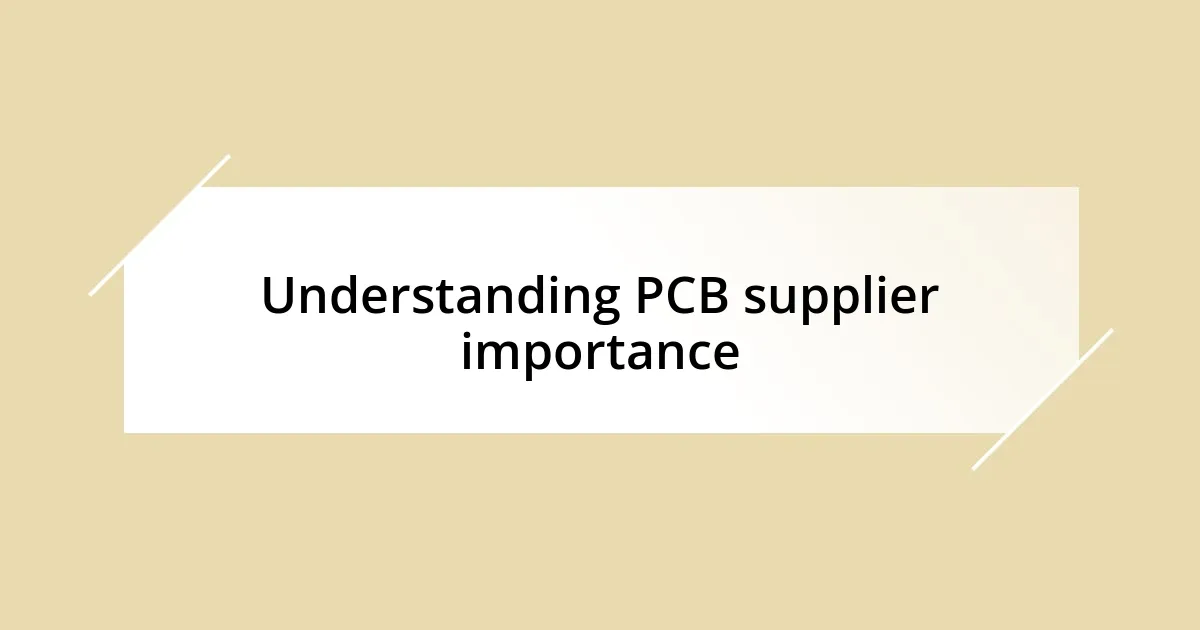
Understanding PCB supplier importance
When I think about the importance of PCB suppliers, I often reflect on the time I faced delays in a crucial project. Those delays cascaded through our timeline, emphasizing how our supplier’s reliability directly impacts our success. A dependable supplier doesn’t just deliver components; they are a partner in every sense, shaping the pace and quality of our work.
Choosing a PCB supplier is like selecting a co-pilot for a journey. I remember the moments when I felt a surge of relief knowing my supplier understood the specifications perfectly, eliminating guesswork. How can you measure that peace of mind? It’s in knowing that someone is just as invested in your project as you are.
The best suppliers provide not just products but insights and expertise. There was a time when I received invaluable feedback on a design flaw from my supplier, which saved us from potential disaster. Aren’t we all looking for suppliers who engage proactively rather than reactively? Their importance goes beyond transactions; they influence the innovation and quality of what we create.
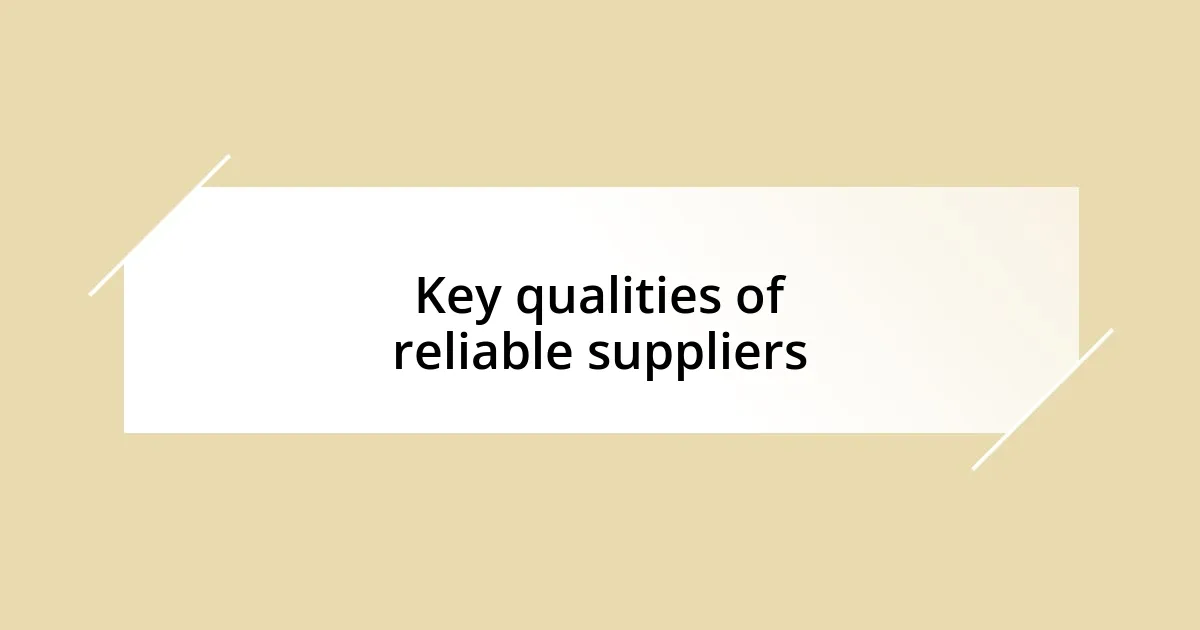
Key qualities of reliable suppliers
Reliable PCB suppliers embody several key qualities that make all the difference in the manufacturing process. First and foremost, communication plays a critical role. I recall a time my supplier reached out eagerly during a project, clarifying details and checking in regularly. Their proactive approach not only kept us on track but also built a sense of partnership that I value deeply. When suppliers communicate openly, it fosters transparency and trust, which are vital in navigating the often-complex world of PCB manufacturing.
Another essential quality is the supplier’s technical expertise. Having a supplier who understands industry nuances is invaluable. Once, I faced a challenge with a design that was on the verge of failing compliance. My supplier took the time to educate me about potential pitfalls and offered alternative solutions. That kind of knowledge-sharing can be a game-changer. It reassures me that my supplier is more than just a source of materials; they’re a vital resource for problem-solving and innovation.
Lastly, reliability in terms of quality control cannot be overstated. I vividly remember a project where a different supplier skimped on quality checks, leading to significant rework. After switching to a supplier known for their rigorous quality assurance, the difference was like night and day. Not only did the quality improve dramatically, but the peace of mind that came from knowing my supplier was diligent in their processes was worth its weight in gold.
| Qualities | Description |
|---|---|
| Communication | Proactive communication fosters transparency and trust. |
| Technical Expertise | Knowledgeable suppliers provide valuable insights and solutions. |
| Quality Control | Reliable quality control ensures consistent performance and reduces rework. |
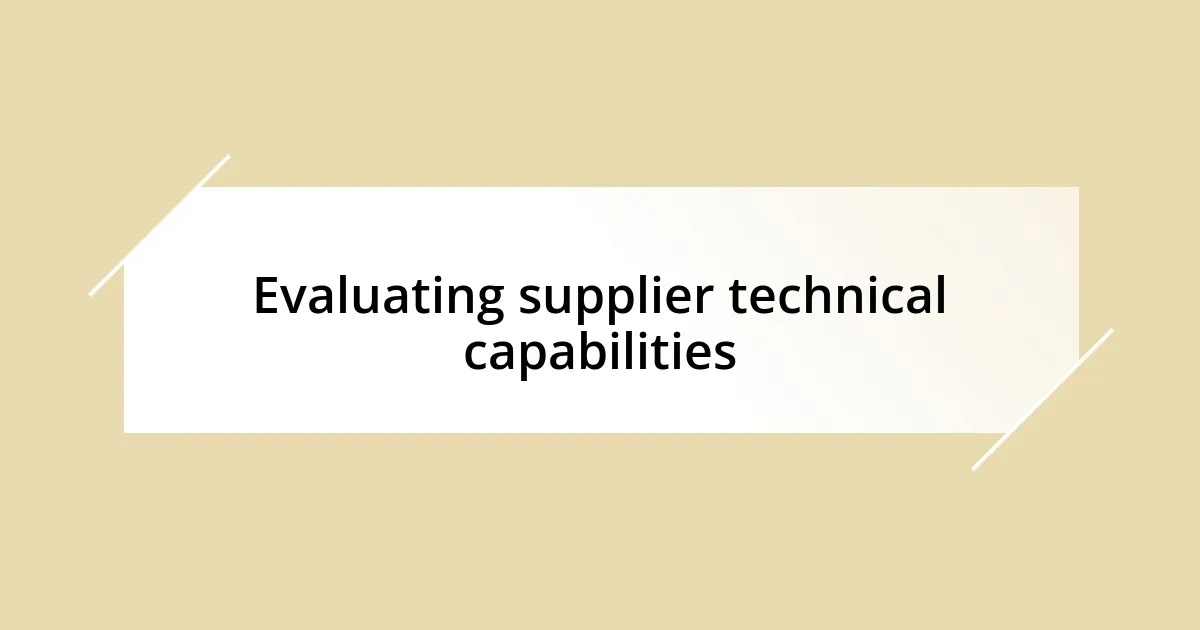
Evaluating supplier technical capabilities
When evaluating a PCB supplier’s technical capabilities, I find it essential to dig a little deeper than their glossy brochures and marketing claims. For instance, during a past project, I remember asking potential suppliers to walk me through their design and prototyping processes. It was enlightening to see how different teams approached problem-solving. The ability to adapt to challenges and provide innovative solutions is a telltale sign of technical competency that often separates the best from the rest.
Here are some key technical aspects to consider:
- Design Flexibility: A supplier should demonstrate a capacity to modify layouts and accommodate last-minute changes without compromising quality.
- Prototyping Capabilities: Look for suppliers who can create prototypes swiftly. Time-to-market can make or break a product launch.
- Technology Adoption: Ideally, the supplier should stay at the forefront of new technologies and manufacturing techniques. Their willingness to invest in the latest equipment often reflects a commitment to excellence.
I recall one particular instance where a supplier showed their technical prowess by guiding me through a manufacturing process that involved intricate fine pitch component placements. Their detailed explanations and hands-on approach not only boosted my confidence but also highlighted their expertise. This experience left me feeling assured and engaged, knowing I was working with a partner who truly understood the complexities of PCB manufacturing.

Importance of communication and support
Effective communication with PCB suppliers is not just a nicety; it’s essential. I remember a crucial moment when my project depended on timely updates. The supplier maintained a consistent line of communication, which alleviated my worries about potential delays. It felt reassuring to know I could reach out and get instant answers, reinforcing that we were working toward a common goal.
Support from suppliers can make a world of difference, especially during critical phases of a project. There was a time when I was navigating unexpected hurdles, and my supplier stepped in with reassurance and practical solutions. Their support was like having a reliable partner in a challenging situation, reminding me that I wasn’t alone in the complexities of PCB manufacturing. Wouldn’t you agree that having someone in your corner can elevate your confidence and overall success?
The importance of communication and support goes beyond just operational efficiency; it cultivates a collaborative environment. When I think back to my best supplier relationships, it’s the open dialogue and willingness to assist that stands out. This partnership mentality fosters innovation and leads to incredible outcomes, proving that the right support can transform the manufacturing journey into a shared success story.
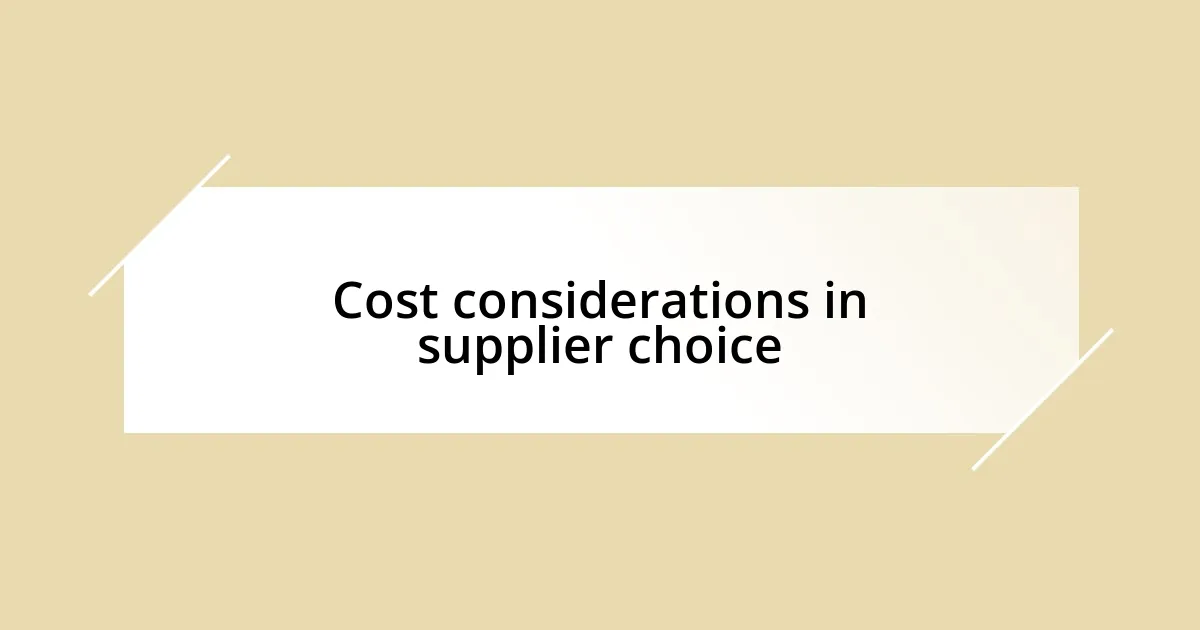
Cost considerations in supplier choice
Cost is often a fundamental concern when choosing a PCB supplier, but it’s not just about the lowest price. I recall a situation where I was tempted by a supplier offering steep discounts. However, after digging a bit deeper, I discovered that these savings could quickly evaporate due to hidden fees and quality compromises. Have you ever faced a similar dilemma? It’s crucial to analyze the total cost of ownership, which includes additional expenses like shipping, rework, and even project delays.
In my experience, balancing cost against quality can feel like walking a tightrope. I once chose a supplier that seemed pricier upfront but delivered exceptional results. The reliability and quality of their work reduced my long-term costs significantly. I remember receiving a batch that was so well-made, I didn’t have to worry about defects or late deliveries. That reassurance was priceless. So, weighing short-term savings against long-term value is something I always consider now.
Another point worth mentioning is the impact of payment terms on your overall costs. Flexible payment options can relieve cash flow constraints, which I have found invaluable, especially during tight projects. For example, a supplier with net-60 payment terms allowed me to allocate funds more efficiently, improving my ability to manage other project expenses. Isn’t it comforting to know that a supplier considers your financial needs while maintaining cost-effective practices? It’s these kinds of considerations that truly elevate the supplier relationship.
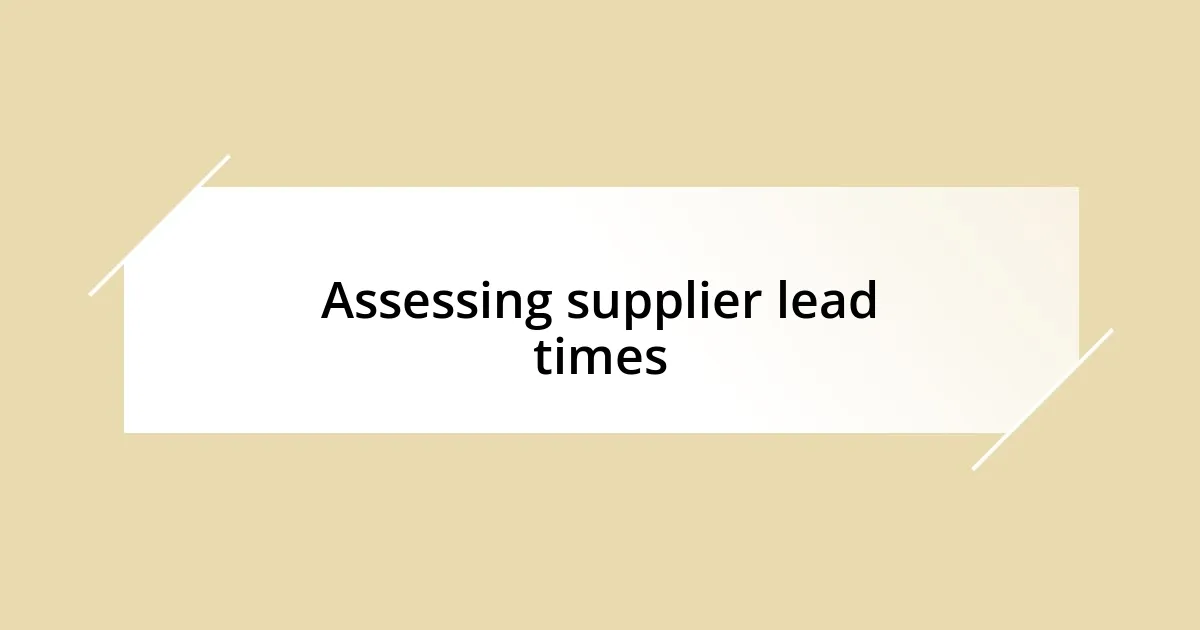
Assessing supplier lead times
Assessing lead times is a critical factor that influences my choice of PCB suppliers. I vividly recall a project where I experienced the consequences of ignoring this aspect. The supplier initially promised a two-week turnaround, but as the deadline approached, it became apparent they were struggling to meet that commitment. The panic that set in was overwhelming, and it made me realize how crucial it is to have transparent lead time estimates.
It’s important to me that suppliers provide not just a timeline but also regular updates throughout the manufacturing process. For instance, one supplier I worked with had a straightforward approach: they communicated any delays before they impacted my schedule. This proactive communication allowed me to adjust my plans accordingly, preventing what could have been a domino effect on my project timeline. Isn’t it refreshing to work with someone who understands the value of keeping clients in the loop?
Moreover, I believe that accurate lead time assessments should factor in potential challenges. In one case, a supplier’s commitment to a realistic timeline helped me prepare for unforeseen issues, from component shortages to quality checks. This proactive mindset not only reduced stress but also fostered a relationship built on trust and reliability. Have you found that working with suppliers who account for these uncertainties leads to smoother project execution? From my experience, the answer is a resounding yes, enhancing the overall collaboration.
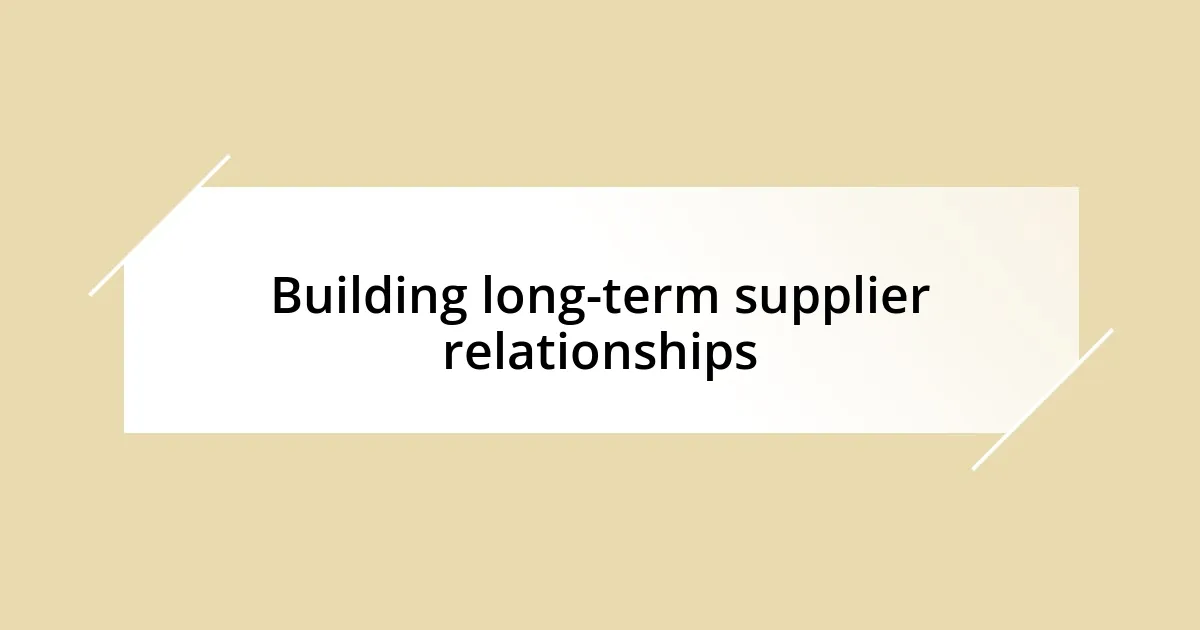
Building long-term supplier relationships
Building long-term relationships with PCB suppliers goes beyond initial negotiations; it’s about mutual trust and understanding that grows over time. I remember developing a close partnership with a supplier who genuinely took the time to understand my company’s needs. This relationship led to open communication, and I felt comfortable discussing challenges as they arose. Doesn’t it feel great to work with someone who is truly invested in your success?
I’ve learned that investing in relationships yields significant benefits. For instance, during a tight project, I asked one of my long-term suppliers for a favor—expediting an order at short notice. They didn’t hesitate to help, thanks to our established rapport. This goodwill made a meaningful impact, and I was reminded that these connections could provide support during crucial moments. Have you experienced that sense of security when you know your supplier has your back?
Lastly, I believe that regular check-ins can strengthen supplier relationships. I make it a point to have candid conversations about performance, expectations, and even future goals. This practice not only keeps both parties aligned but also fosters an environment of collaboration. A few months back, I organized a feedback session with a supplier, and it opened up a dialogue that transformed our partnership. Looking back, it’s evident that nurturing these relationships can lead to innovative solutions and opportunities together. Isn’t that the kind of partnership that makes work more fulfilling?












